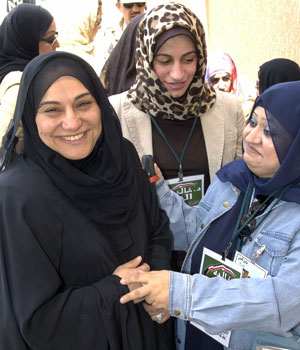
Female Kuwaiti candidate Khaleda Al Khadher (L) jokes with a supporter at a polling station in Roumaithya district in Kuwait April 4, 2006 (REUTERS)
KUWAIT (Reuters) – Women made history in Kuwait on Tuesday by voting and running for office for the first time in a local by-election after the conservative, U.S.-allied Gulf state granted them suffrage last year.
Polls opened at 8 a.m. (6 a.m. British time) for the vote to fill a single seat in the 16-member Municipal Council. The rest of the members were elected or appointed last year.
“Today is the biggest feast we have been waiting for more than 40 years,” Khaledah al-Khadher, one of the two female candidates, told Reuters at a polling station in Salwa suburb.
“This is the first time Kuwaiti women can show the men that we are capable, it is important that we do our best and leave the outcome of the polls to God,” added Khadher, wearing a conservative black Islamic-style dress.
Some 28,000 voters, including 16,000 women, are eligible to cast ballots for the six men and two women standing.
Last May, parliament passed a government-sponsored bill granting suffrage to women who had fought for their political rights for more than four decades.
The United States has urged Middle Eastern states to reform their political systems.
Tuesday’s election paves the way for women to take part in 2007 parliamentary polls, the first since Kuwait’s new ruler, Emir Sheikh Sabah al-Ahmad al-Sabah, took office this year after the death of his half-brother.
“Contesting this election and other elections is a must for Kuwaiti women, it is a right women have been denied and they have now got it back,” said candidate Khadher, 48.
“This is a historic day,” said an announcer on state-run Kuwait Television, which carried live footage of male voters in traditional white robes and women, many in black gowns covering them from head to toe, voting in separate rooms.
Islamist MPs, who were opposed to granting women political rights, had pushed through a clause requiring separate polling stations for men and women.
Prime Minister Sheikh Nasser al-Mohammad al-Sabah said in remarks published on Tuesday that the political participation of women would boost Kuwait’s international standing.
Visiting a polling station with some cabinet members, he said on Tuesday: “We say to Kuwaiti women ‘God bless you’. You are welcome to participate in all spheres of life.”
Kuwaitis voted in wider municipal polls last June but women could not take part because the suffrage bill was delayed by conservative Islamist and tribal MPs.
Shortly after women won the vote, the reformist government appointed its first female cabinet minister, Planning Minister Massouma al-Mubarak, a rights activist. Mubarak visited polling stations with the prime minister.
“Our participation today is good for the nation and is good for the future of Kuwaiti women,” Jinan Boushahri, the other female candidate, told reporters.
Kuwait is the first Gulf Arab state with an elected law-making parliament, but Qatar became the first country in the conservative region to name a woman minister in 2003, and most countries in the area have since followed suit.

Kuwaiti women check with their candidate’s representative before entering a polling station to cast their ballot for municipal council elections in Roumaithiya, Kuwait, April 4, 2006 (REUTERS)

A Kuwaiti woman looks for her name on a list that will designate where she will cast her vote for municipal council elections at a polling station in Roumaithiya, Kuwait April 4, 2006 (REUTERS)
